LOVE LIES BLEEDING (2024)
Gym manager Lou falls for Jackie, a bodybuilder who's passing through town en route to a competition in Las Vegas.
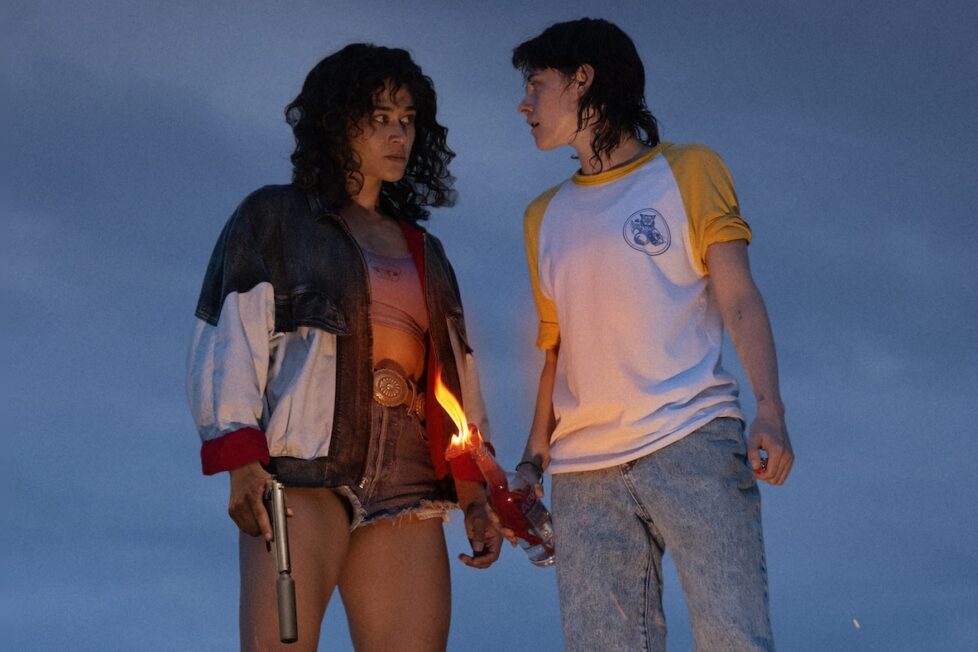
Gym manager Lou falls for Jackie, a bodybuilder who's passing through town en route to a competition in Las Vegas.


The glinting steel of a pistol and the shimmering sheen of sweat will blind you in this New Mexico town. Here, in 1989, fluorescent neon lights cast an unnerving glow on faces in the shadows. The baleful, red hue conveys one absolute truth: danger. And there’s plenty of danger in Love Lies Bleeding.
Jackie (Katy O’Brian), a bodybuilder on her way to Las Vegas for a competition, stops off in a small town. There, she takes a job at a shooting range and, while exercising at the local gym, meets Lou (Kristen Stewart). Their connection intensifies quickly, with Lou even supplying Jackie with steroids to help her perform in the competition. However, trouble soon finds the pair and they can only rely on each other to escape unscathed….
I haven’t seen director Rose Glass’s debut film, Saint Maud (2019). Needless to say, given how impressed I am by her second feature, I will be seeking it out immediately. Love Lies Bleeding is an intelligent and visceral thriller, boasting compelling performances, striking cinematography, and immersive, palpable sound design, making it the best film I’ve seen at the cinema this year.
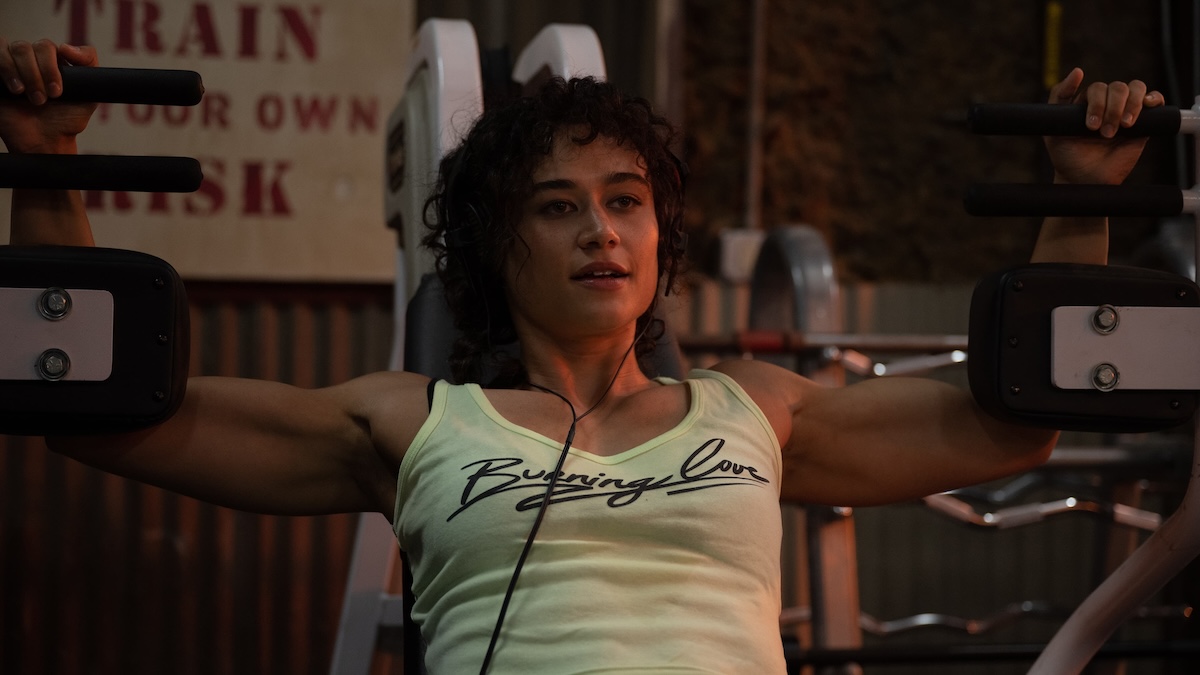
It’s difficult to pinpoint any one element of the film that makes the final product work so well. However, if I could only sing the praises of one aspect, it would be the use of sound. A constant, overwhelming wall of noise bombards the audience. While it undoubtedly contributes to a stressful experience, it also provides a cohesive, comprehensive shape; the film practically breathes as everything fits together like an intricate puzzle.
Scene transitions become seamless, highlighting the critical link between sound and cinematography. Unlike many filmmakers who treat audio and image as separate entities, Glass creates a masterclass in audiovisual storytelling. Self-help tapes shift between the muffled, diegetic background hum of the tape deck and a pervasive, non-diegetic texture of noise. This interplay allows the sound design to suffuse the narrative, divulging the protagonist’s internal struggles, motivations, and addictions.
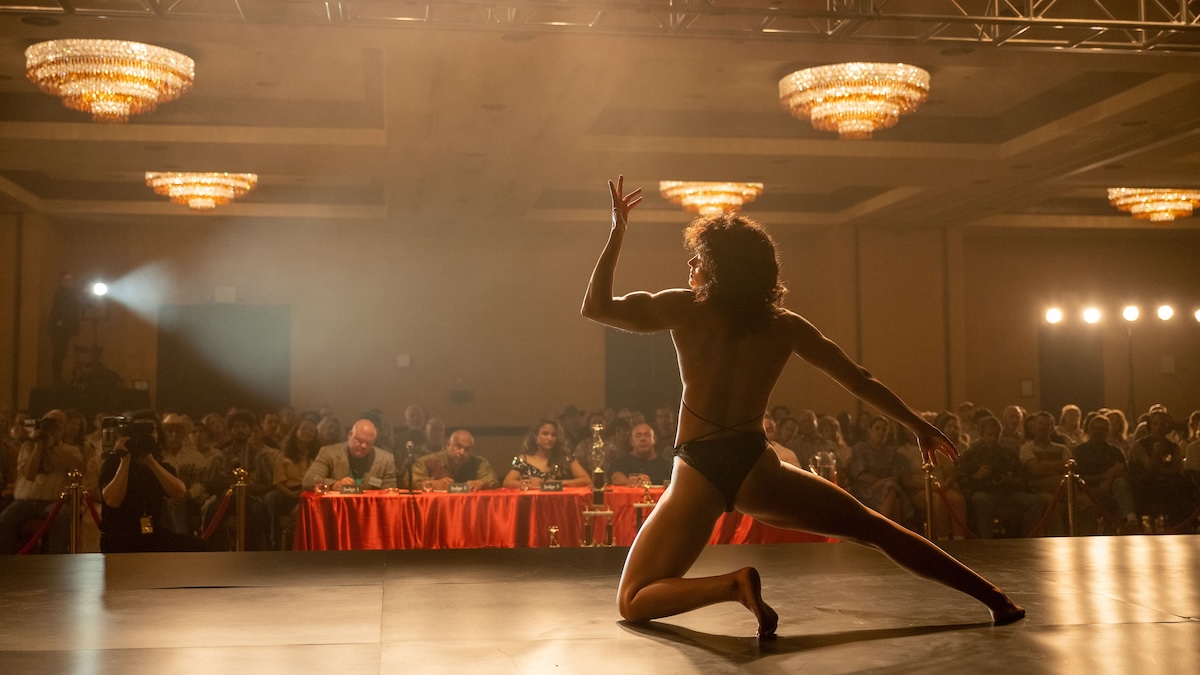
The film benefits further from a score by Clint Mansell. This English musician and composer has established a reputation for crafting unsettling soundtracks, as evidenced by his collaborations with Darren Aronofsky. While Requiem for a Dream (2000), The Wrestler (2008), and Black Swan (2010) are all masterpieces in their own right, their impact would be significantly diminished without Mansell’s disconcerting music.
Mansell creates an incessant, fraught theme, with a frenetic energy that evokes a wild animal pacing up and down in a cage; you can feel that something bad is going to happen, any minute now, but you simply can’t be sure of what. His music creates an immediacy that permeates the entire film. Simply put, his score engenders the sensation of unceasing threat and it immeasurably augments the film.
There’s also the grotesque juxtaposition of close-ups of Jackie’s contorting body with the use of ripping sounds. These include the sound of muscles tearing, joints popping out of place, and bones grinding and snapping. All of this to say, give the Foley artists a raise; their ability to impart the physical sensations of someone losing control of both their mind and body was utterly superlative.
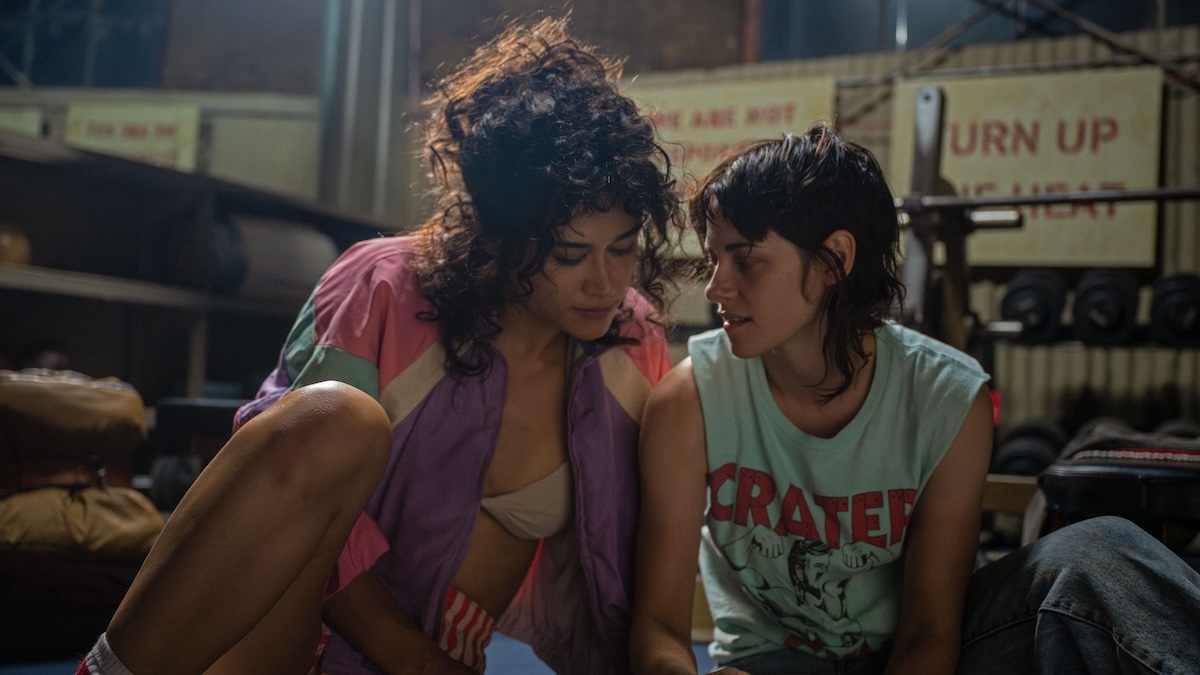
Of course, editor Mark Towns deserves commendation, too. He creates an electric pace in the film, ensuring there are no dull moments in this thrilling outing—if there were any slow bits in the rough cut, they certainly didn’t make it into the final product. However, this doesn’t mean the film rushes anything. It maintains a blistering pace, but no crucial part of the storytelling is neglected. Character development and motivation are still revealed, all while maintaining a speed that will induce anxiety in some audiences.
The cinematography is equally striking. The bold, dazzling colour scheme is certain to impress any visual artist, despite the occasional gaudy effect—a deliberate homage to the muscle magazines and gym advertisements of the 1980s. Director of Photography Ben Fordesman captures the aura of the time period perfectly, whilst also using the lurid palette to foster an overarching sensation of threat. This unease is further amplified by Fordesman’s camerawork, which subtly hints at impending danger, complementing the ominous sound design.
The performances cover any potential weak points. O’Brian is utterly convincing as a benevolent bodybuilder turned steroid-crazed goon. Meanwhile, Stewart delivers a subtle, nuanced performance as our protagonist, proving once again her talent as an actress who was previously hampered by poor material. The Twilight Saga did such a fine job of getting terrible showings from capable actors that it should almost be applauded. Thankfully, both Pattinson and Stewart have thoroughly redeemed themselves with powerful performances in The Lighthouse (2019) and Clouds of Sils Maria (2014) respectively.
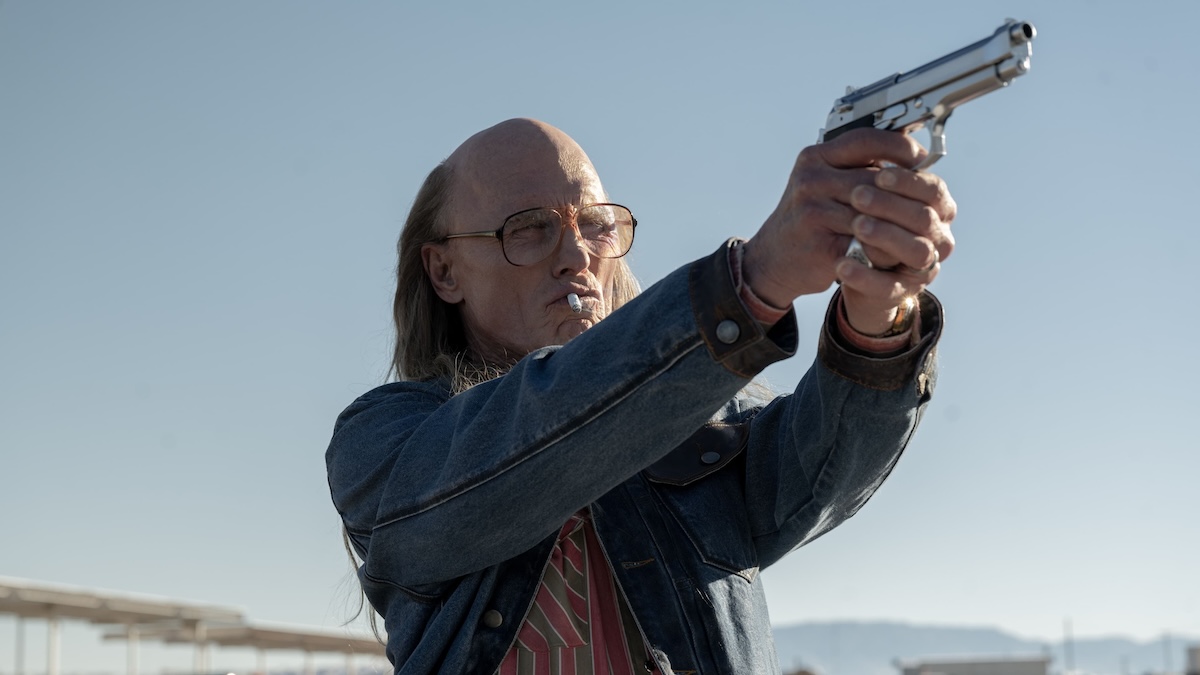
In addition to this, Ed Harris delivers another stellar performance in a career full of them. His portrayal simmers with barely-contained violence, an unsettling malice that’s only ever implied, a testament to his skills as an actor. That said, his obsession with bugs in the film is truly nauseating. Full marks again to the Foley artists for making my stomach churn.
Few film distribution companies have established a brand quite as well as A24. Despite the fact they have primarily functioned as a distributor, through adept marketing they’ve carved out an intriguing niche. Amid the mainstream blockbusters churned out in the 2000s, innovative filmmakers seeking to deviate from the norm found themselves with few feasible options.
As a result, the company has practically established a personality as the eclectic haven for divergent filmmakers. Consequently, it’s arguable that A24 has become a bigger draw than any of the stars in their films. Cinephiles might not be swayed by Hollywood A-listers, but they’re highly likely to be chomping at the bit for A24’s next release. I, for one, eagerly anticipate their next flick.
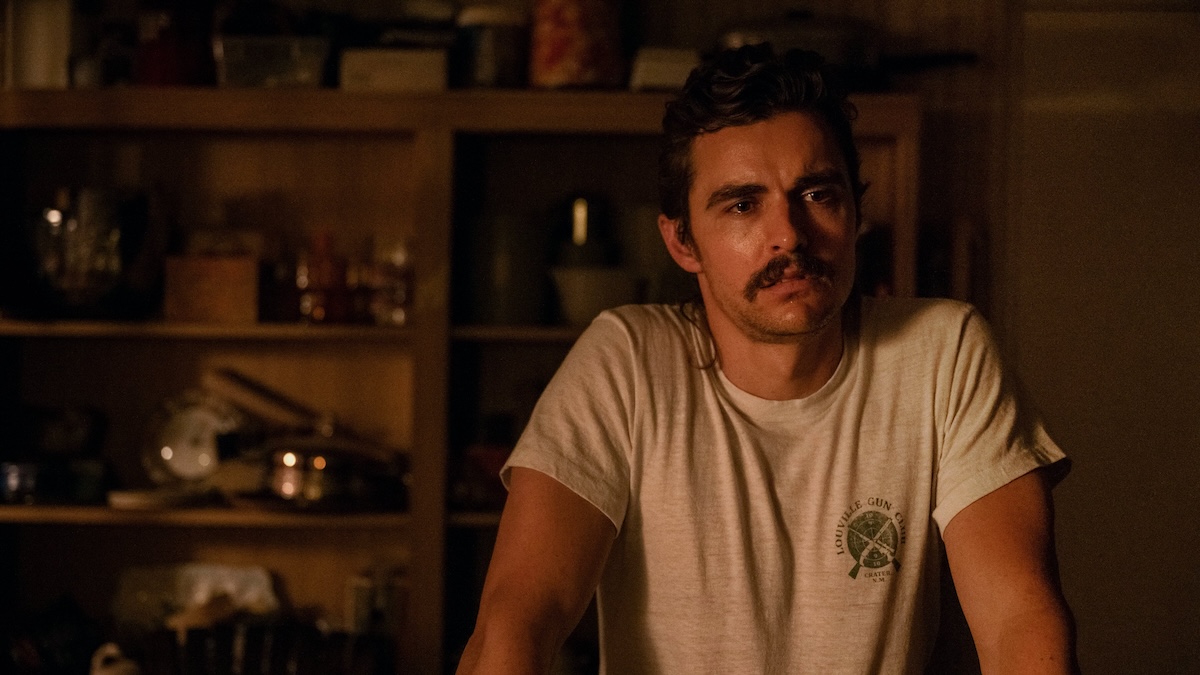
“I fucking love you, you idiot!” At once a hopeful tale of the things we do for love and a gripping, heart-pounding thriller, Love Lies Bleeding becomes much, much more than the sum of its parts. This mostly seems to be because director Glass is not a one-dimensional filmmaker; she visualises a cohesive whole and starts backwards. For this reason, everything fits together, creating a tangible vision, a visceral, immersive experience that you may think you can reach out and touch.
The film is also a prime example of how any superb film relies on a multitude of talented people—Love Lies Bleeding certainly has that in spades. From the sound design, art department, hair and wardrobe, cinematography, performances, music, and direction, it’s a stellar collaboration from start to finish, a thriller that never lets its foot off the gas until the final sequence.
There have been so many romantic thrillers over the years that you might think it’s impossible to create something entirely new. And yet, Rose Glass achieves just that. She crafts a film that frequently shocks with its vivid surrealism and sheer inventiveness, never giving the audience a moment to catch their breath thanks to its exhilarating pace. Glass delivers on genre expectations while simultaneously bending the category to her creative will. I’m already eagerly awaiting her next directorial venture, which, one hopes, will feature just as many gloriously crude, grubby mullets.
UK • USA | 2024 | 104 MINUTES | COLOUR | ENGLISH

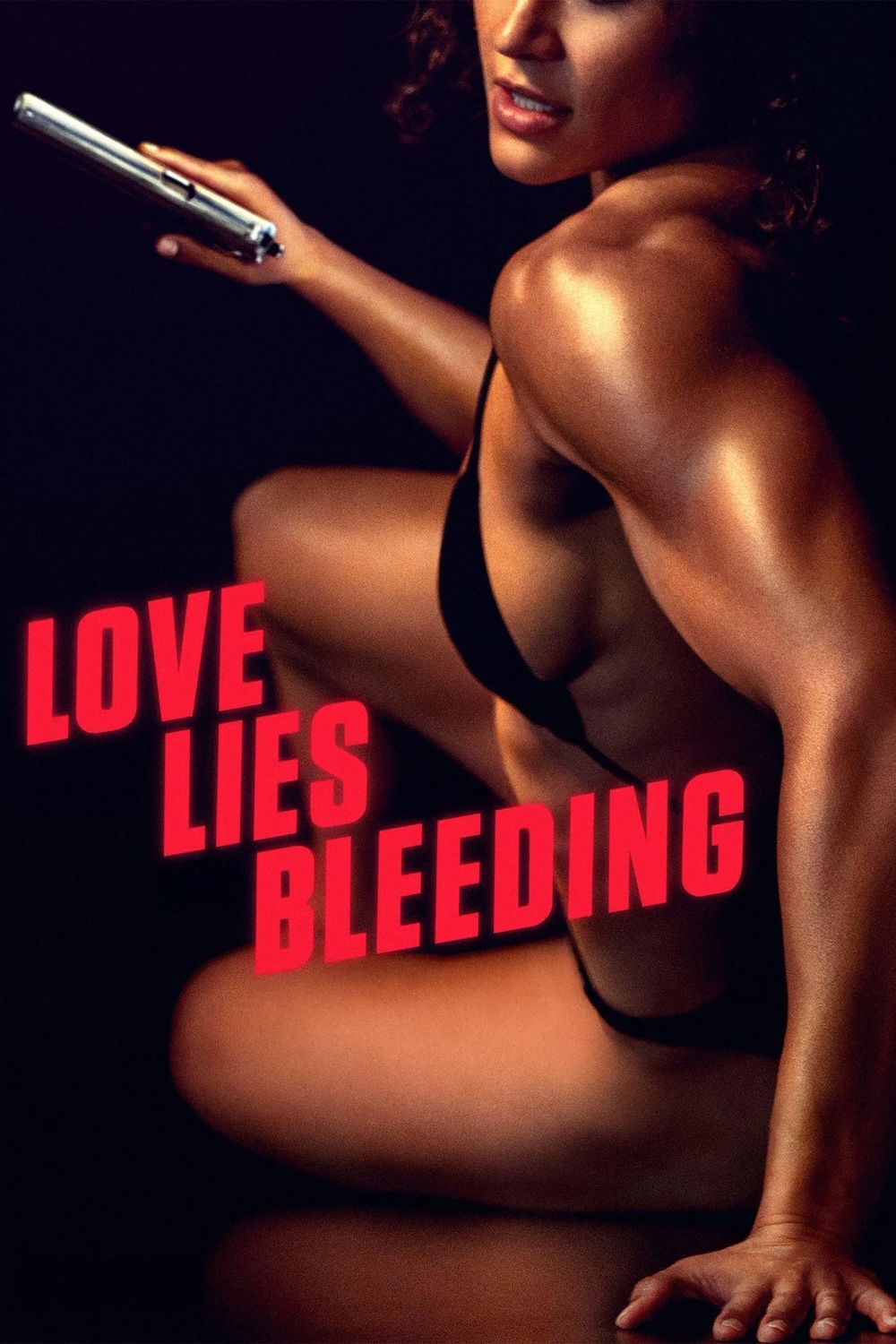
director: Rose Glass.
writers: Rose Glass & Weronika Tofilska.
starring: Kristen Stewart, Katy O’Brian, Jena Malone, Anna Baryshnikov, Dave Franco & Ed Harris.
